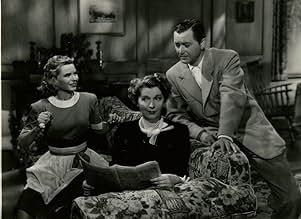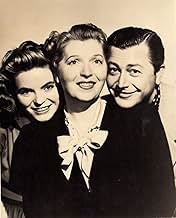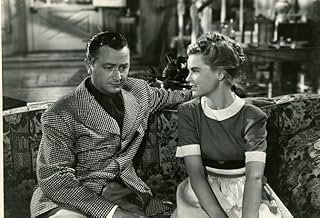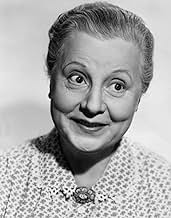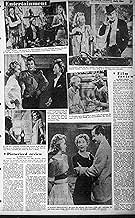Child bride Claudia Naughton has made life difficult for her husband David because she can't stand living so far away from her mother. She's also afraid that her husband doesn't find her des... Read allChild bride Claudia Naughton has made life difficult for her husband David because she can't stand living so far away from her mother. She's also afraid that her husband doesn't find her desirable enough. To remedy both situations, she sells their farm to an opera singer so they'... Read allChild bride Claudia Naughton has made life difficult for her husband David because she can't stand living so far away from her mother. She's also afraid that her husband doesn't find her desirable enough. To remedy both situations, she sells their farm to an opera singer so they'll have to move back to the city near her mother, and she tries to make her husband jealou... Read all
- Awards
- 3 wins total
- Hartley Naughton
- (uncredited)
- Maid
- (uncredited)
- Mrs. Feiffer
- (uncredited)
- Mr. Feiffer
- (uncredited)
- Carl
- (uncredited)
Featured reviews
McGuire was 27 when this movie was made. Her "late" start in film, came after she had been on the stage. Her first role was at age 13 in an Omaha community playhouse. She then performed in high school and college, and wound up in summer stock at age 21. By 1937 she was acting on Broadway.
McGuire never won an Academy Award but was nominated for one, and later for three Emmy's for television. Of all the roles of the few actresses who received nominations in their debut films, McGuire was certainly deserving of an Oscar nomination here. But 1943 was like many another year during the golden age of Hollywood. So many very talented actresses were in as many great movies that made the competition exceptional that year. Jennifer Jones won the best actress Oscar for her role in "The Song of Bernadette;" over Ingrid Bergman in "For Whom the Bell Tolls." And three other great actresses nominated were Greer Garson, Jean Arthur and Joan Fontaine.
McGuire had many succeeding films with lead roles, most of which were highly successful films. While she did appear in a few TV series late in her career, she didn't have her own show or series. She made occasional movies in matronly or other dramatic roles, and she made TV movies as well. She also returned to the stage and helped Gregory Peck and some other actors form the La Jolla Playhouse.
Well, this is a fine movie about life, with McGuire's Claudia as a very young bride. She's almost immature, very energetic and almost childish in her enthusiasm at times. She is somewhat naïve, very close to her mother, and very much in love with her husband, played very well by Robert Young. This was McGuires first of three very successful pairings with Young. While he had a long career in cinema with many good films under his belt, Young will forever be remembered mostly as Marcus Welby, M. D., for that highly popular TV series that ran for eight years from 1969 through 1976.
Others of the cast of this film give very good performances. Ina Claire is Mrs. Brown, Claudia's mother. Reginald Gardiner is a playwright neighbor in the Naughton's rural Connecticut setting. And, Olga Baclanova, the Russian actress who defected from the Soviet Union in 1925, has a nice role, adding some comedic spice to the film.
One word of caution for those who might think of watching this film in a family setting. The younger audiences of the 21st century may find this film hard to sit through. It is heavy with talking and dialogue. So, younger folks (through middle age, no doubt) who thrive on lots of action and relentless motion in their viewing may quickly be bored.
Claudia is a naive young woman who lives on a farm in rural Connecticut before WW II. The farm is isolated and has no electricity. Her major contacts with the world are her architect husband (Robert Young) and her mother (Ina Claire) who lives in New York City. She is devoted to both but is torn between living with her husband at the cost of being separated from her mother.
A few colorful characters breeze through her rural idyll. There's a roguish writer (Reginald Gardiner) who lives down the road and who makes a pass at her. And there's an opera diva (silent film star Olga Baclanova) who wants to buy the farm. These characters change Claudia and her relationship with her husband.
There are other changes coming to Claudia. She discovers she is pregnant just as she discovers a sad truth about her mother. Claudia adjusts to her world slowly but resolutely. It's called growing up.
Wonderful performances by all with McGuire center stage. Director Edmund Goulding had wanted retired superstar Marion Davies for the role of the mother. He knew she would add some star wattage to the cast. She would have been marvelous. Legend has it Davies' long-time love William Randloph Hearst could not bear the thought of his beloved Davies playing a middle-aged mother. She was 46 years old at the time. What a pity she bypassed the film.
The film instantly established Dorothy McGuire as a film star and was followed by a sequel CLAUDIA AND David in 1946.
Together they have a unique rapport on their Connecticut farm. Trouble is Claudia's wracked at times by self-doubt and her rather plain looks. Besides she's still somewhat dependent on her indulgent mom (Claire). Clearly, Claudia still has some growing up to do, especially in learning to deal with responsibility and life's dark side, which is what the movie's about.
Goulding directs with a light hand, never allowing the material to drift into sentimentality, the bane of domestic dramas such as this. And I love the sheer nuttiness of the Russian countess (Baclanova) when she breaks into her 5-alarm operatic screech that's like nothing I've seen or heard-- my ears are still ringing! But it's clearly McGuire's movie, showing why Claudia's warmth and charm launched the actress on such a long and successful film career. And I agree with another reviewer: if you like this film, you'll also like its sequel Claudia and David (1946), which is even better.
It's a fun movie none the less, and at times even moving, belonging to an era when mainstream culture was supposed to be genteel. If if were made today half of it would be set in the conjugal bed, with the leading characters naked most of the time. With considerable subtlety it's suggested in this film that indeed a good deal of the action is in the bedroom, but they never, of course, show any of it. It's easier today to see the virtues of such bright entertainment as this, though when it was first performed out the play, like so many others like it, was attacked at times rather brutally by intellectuals in left-wing journals. A case can be made for Claudia being no more than anodyne entertainment to please and flatter the bourgeoisie into thinking that they're nicer and smarter than they are in real life. Perhaps so. But as an artifact of its times Claudia is still a pretty good show, and on occasion a fascinating if Hollywoodized glimpse at how the comfortable middle classes lived in the years before the postwar boom.
Did you know
- TriviaThe film had its world premiere in Omaha, Nebraska, Dorothy McGuire's hometown, in late August 1943.
- ConnectionsFollowed by Claudia and David (1946)
Details
- Release date
- Country of origin
- Language
- Also known as
- Claudia, esposa moderna
- Filming locations
- Production company
- See more company credits at IMDbPro
- Runtime
- 1h 31m(91 min)
- Color
- Aspect ratio
- 1.37 : 1

